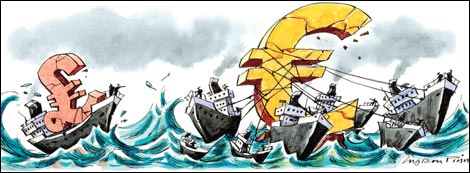A Call for Devaluation or Floating?
Recently, there has been news across various channels that bank CEOs are calling for further devaluation of the Naira. Standard & Poors even predicted that naira devaluation is inevitable. The Naira was devalued late last year by 8% and later this February, it was devalued further by about 17% to NGN 196.95 to a dollar. It is surprising, however, that the call to further depreciate is emanating from different quarters just few months down the line. What could possibly be the justification for their argument?
The argument is simple, the current peg is unrealistic! It is unrealistic because despite the peg, the value of the Naira had depreciated further. In the parallel markets, the Naira exchanges for about NGN 241.45 to a dollar (as at the time of this writing). More so, the reason why it has not depreciated further is because of the ban, by the CBN, on some foreign imports [The toothpick ban]; it could have been worse!
However, what amazes me is why we should keep devaluing the Naira. The only realistic solution, is to let the Naira go on free float. It is obvious that current economic conditions do not support the current peg and economic outlook shows that the Naira will not be stable soon no matter the $1 to NGN 1 promised to Nigerians by the new government. A very vivid picture of things to come is the current nuclear deal agreement with Iran and the lifting of the sanctions against the country by world powers.
The first crude oil deposit found in the Middle-east was discovered in Iran in 1908. Iran has the third largest oil reserve in the world as at 2007 and accounts for 13% of OPEC reserves. Iran is also the second largest gas reserve holder in the world with about 17% of total world reserve. Iran is capable of producing 6 million bpd compared with Nigeria’s 2 million bpd. Before the sanctions, Iran was considered an energy superpower with the ability to affects prices by tweaking supply.
The implication of this is, with Iran becoming a major global market player, more supply will flood the markets because the aim of Iran is to gain lost market share. Iran lost most of its Asian trade to Saudi Arabia and Kuwait. In Europe, it lost most of its market to Russia, Saudi Arabia and Iraq. It is estimated that Iran currently has a 30 million barrels of oil in tankers and about 35 million barrels will find its way into the market. Price is definitely going south!
The truth is, the CBN is not positioned to defend the Naira against coming challenges. The external reserve as at May, 2015, stands at $ 28,566.54 million (according to the CBN). It is better to stop defending the Naira altogether right now that is, allow the currency to float freely according to markets conditions and commit the Nations’ resources to better use. The resources of the country will be more efficiently utilised if economic policies are more domestic focused than international-focused. The free float will have a major effect on the local economy, no doubt. Prices of common goods will run up and inflation may even reach double digits. However, this will force local production and government can implement more domestic focused policies and save Nigerians from the brouhaha of the ever falling exchange rates.
If you are wondering what this is all about, check out my post where I explained exchange rates here.


Recent Comments